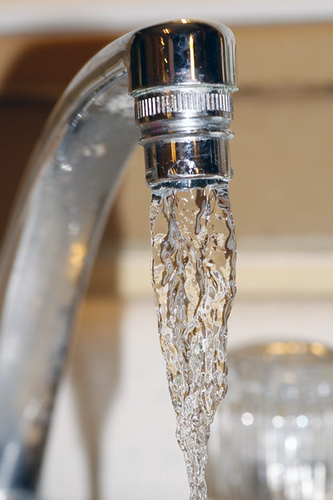Today, residents of nine West Virginia counties—including my parents—are without water because of a spill from a chemical storage container near a water treatment plant on the Elk River in Charleston. The spill affected some 200,000 people, who were advised to avoid using their tap water for drinking, cooking, cleaning, even bathing.
The chemical is used in the processing of coal.
What Happened?
On Thursday morning, the WV Department of Environmental Protection (DEP) responded to reports of a strange odor from a chemical storage facility owned by Freedom Industries, which makes specialty chemicals for the mining, steel, and cement industries. Officials found the chemical, 4-methylcyclohexane methanol, leaking from a 48,000-gallon tank at Freedom’s Etowah River Terminal, which is just about a mile upstream from a water treatment plant run by West Virginia American Water.
Although the chemical is not lethal, it does pose some health risks, including skin and eye irritation, and could be harmful if swallowed. The chemical’s MSDS says that the “toxicological properties of this material have not been fully investigated.” The spill fouled the water system serving much of the Kanawha Valley. In the evening, the governor issued a state of emergency in the nine counties served by the affected water system. Water experts are monitoring the situation but there is no word on when the water will be declared safe to drink.
While the DEP was able to investigate complaints and issue warnings the same day, it was clear to investigators that the leak had been ongoing for some unknown amount of time. DEP officials discovered that the chemical had been leaking out of a storage tank and that it had overwhelmed secondary containment features. However, the official statement from the water company, issued three hours before the state of emergency was declared, informed citizens that the chemical “does not present a health risk to customers.” The water company later issued a do-not-drink notice as a precaution.
The lack of transparency by the company regarding the chemical’s known, albeit non-lethal, risks compromises citizens’ right to know and contradicts public officials’ efforts to help keep communities safe from harm.
Coal is Dirty
Any coal miner will tell you that coal is NOT clean, period. But there are many steps involved in getting the coal out of the ground and delivered to the place where it’s burned. For example, did you know that coal must be washed before being burned? This is done in part to reduce air pollution, but represents increased risks of water pollution because the wastewater left behind from the cleaning process is often stored in large slurry impoundments. The chemical that spilled in the Elk River is used to clean the coal before it is shipped away and burned in power plants and steel mills.
Economic Impacts
Schools and businesses closed throughout the nine-county region today, and it remains unclear how long they will have to remain closed. Restaurants in Kanawha and Putnam Counties that are served by West Virginia American Water were ordered to close down by local health departments. Depending on how long the do-not-drink order remains in place, the closures represent a loss—potentially large—of economic activity to these local communities. President Obama even sent federal disaster aid to the affected counties, directing the Department of Homeland Security and Federal Emergency Management Agency to coordinate with local officials.
Not a dime of these costs will be reflected on your electric bills.
The point is that the production of electricity from fossil fuels carries hidden costs that come in a variety of forms including air pollution, water pollution, impacts on public health, and miner health and safety. Economists call these “externalities.” West Virginia is no stranger to these impacts, particularly with regard to impacts on water and the risk to miners. And they are not limited to coal; with natural gas production booming in the state, impacts from that industry are being felt as well. Just over a year ago, a gas pipeline burst, burning down four homes and melting a section of interstate highway north of Charleston.
By contrast, the cost of renewable energy continues to fall—with wind power cheaper than both coal and natural gas in some cases. And renewables don’t pose such serious risks to public health and the environment.
Although water distribution centers have opened throughout the region, lines were long and some centers were running out. This sort of thing—water contamination from fossil fuel development generally, not just coal—is becoming more and more common. As I thought about my dad driving about 60 miles and back to buy six gallons of water, I wondered also wondered how policy makers might do a better job of protecting the health and safety of our communities.

